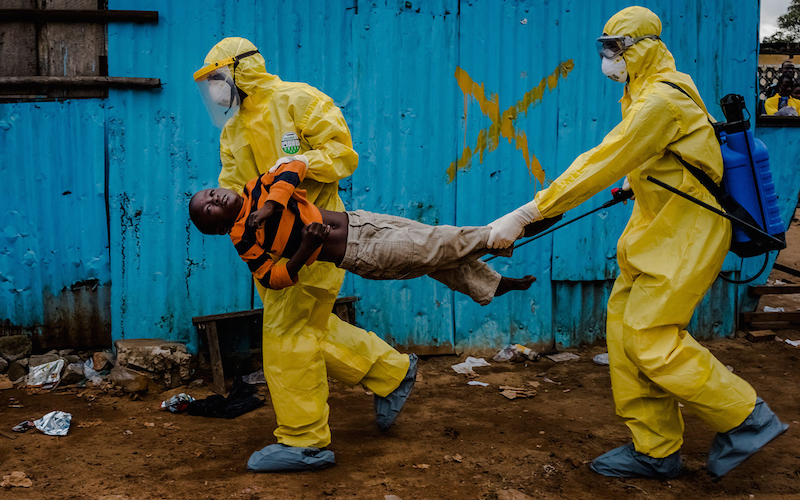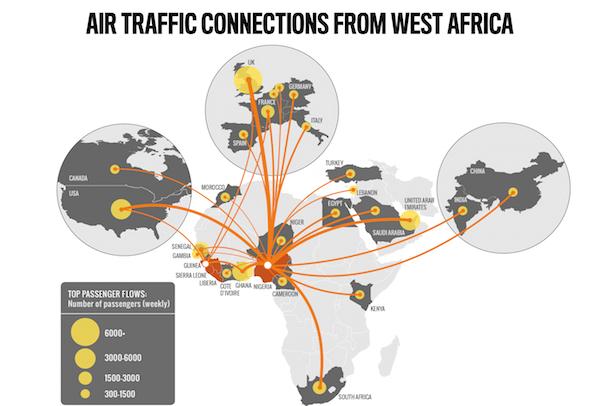
The Impact Ebola will have on National Security
The outbreak of Ebola in West Africa has caused tremendous fear across the globe. According to the Centers for Disease Control and Prevention (CDC) there have now been 10,141 confirmed cases that have resulted in 4,922 deaths worldwide as of October 24, 2014. The majority of the cases are confined to Guinea, Liberia, and Sierra Leone but travel-associated cases have been transmitted to Mali, Senegal, Nigeria, Spain, and the United States. Although there has not been a large outbreak in the United States our federal government has approached the possibility with great stress that any potential transmission of the disease is a matter of national security.
The first case in the United States was diagnosed on September 30, 2014 in Dallas, Texas on a patient that had recently traveled to Liberia. Eric Duncan, now known as ‘index patient,’ passed away on October 8, 2014 as the first patient to have contracted the disease overseas but to pass away in the United States. The head of the CDC, Thomas Friedan, has been urging hospitals nation wide to test for Ebola when patients come in displaying symptoms of the disease and a wary travel history.
The facts of the Ebola disease are critical to be mindful of due to the importance of raising awareness of risk factors in order to prevent transmission of infected persons to others. According to the World Health Organization, the EVD first appeared in Africa almost 40 years ago and maintains a fatality rate of around 50%. The high fatality rate is only one scary statistic for a disease that has the power to be easily transmitted. Symptoms of the Ebola virus consist of fever, muscle pain, headache, sore throat, vomiting, diarrhea, and rashes among others. In order to be properly diagnosed there has to be confirmation via laboratory testing that can take up to 48 hours and is considered a very high biohazard risk for all those involved in the process.
White House Efforts
There has not been an overwhelmingly effort from countries worldwide to help aide countries that have been affected. The Red Cross has over 5,000 volunteers trained to combat the EVD but there has to be more involvement on the global level in order to help contain the most deadly outbreak of EVD in history. President Obama commented to CNN reporter, Betsy Klein that, “If we don’t make the effort now, and this spreads not just through Africa but other parts of the world, there’s the prospect that the virus mutates. And then it could be a serious danger to the United States.”
President Obama has stated from the beginning of the outbreak that he considers this a top national security priority and that this is not a matter of charity but a humanitarian effort to protect the safety of the United States. Earlier this month, efforts to address the EVD outbreak were to use an all-hands-on-deck approach including efforts from public health, the White House, the Department of Defense, and America’s prestigious science teams in controlling the outbreak. Recently, states have been implementing their own 21-day quarantine efforts including Florida, New York, New Jersey, Illinois, Texas, Virginia, and even Maryland to help monitor the state and federal health department efforts (the State of Maine having a recent and countervailing lower court ruling).

Military Efforts
The spread of a deadly disease is most certainly a concern for national security and a feasible option to combat EVD is to involve U.S. military resources. There is now a 30-person team who has been specifically trained as an Ebola response team to protect health care workers being quarantined. The Ebola response team can be ready for deployment in 72 hours’ notice and must be approved by Defense Secretary Chuck Hagel before acting on any orders.
The team has been trained in infection control, protective equipment, and detection. The team has received training at the Education, Training and Simulation Department of the San Antonio Military Medical Center. Command surgeon Air Force Col. John J. DeGoes and Army Gen. Charles H. Jacoby Jr. have conducted the training and creation of this specialized team not only to fight Ebola but will also be used a precedent for future medical response teams on behalf of the DOD, Health and Human Services, Dept. of Homeland Security and other military branches. The military is currently deploying 4,000 personnel to West Africa to assist with the outbreak but the response team will only be used domestically if requested by the Centers for Disease Control but only with orders from the DoD.
Possibility of Bio-Terrorism
The level of potential terror risk posed by Ebola as a biological weapon has brought concern to the Department of Defense. The outbreak in West Africa has been occurring in a conflict driven zone occupied by terrorist organizations such as Boko Haram. The U.S. invested $140 million back in 2010 in a company called Tekmira to develop cures for the virus and continues to still get funding from the DoD to this day.
EVD is not believed at this time to be used as a bio-terror agent but possibilities are endless with today’s terrorist organizations. The U.S. Army Medical Research Institute for Infectious Diseases focuses on “protecting the Warfighter from emerging, genetically being altered, and unknown biological threats” as its mission in battling bio-terrorism. The DoD invests in research to protect against both intentional use and natural exposure of diseases that can impact not only Americans but also humans worldwide. There are too many intricate and scientific details that would be required to handle EVD in order to turn it into a bio-terror weapon but the funding for research now may help eliminate the possibility in the future.
What’s in Store for the Future?
The Pentagon has also emphasized the relevance of EVD being a national security matter and being prepared domestically to control the disease is critical before being able to provide aide globally. President Obama has admitted that the United States must play a major role in combating Ebola in other infected countries but this is a global problem, which requires intervention from other national governments other than the United States.
The high crisis magnitude of the outbreak needs U.S. intervention but the United Nations needs to require more involvement from others in the aide process. As the American public continues to remain in a state of palpable apprehension over the EVD there has to be consideration of the turmoil that is occurring in West Africa as well. President Obama’s emphasis on providing aide to regions that have massive EVD outbreak only helps to prevent future national security threats that could potentially occur in America if the disease is not contained overseas.
